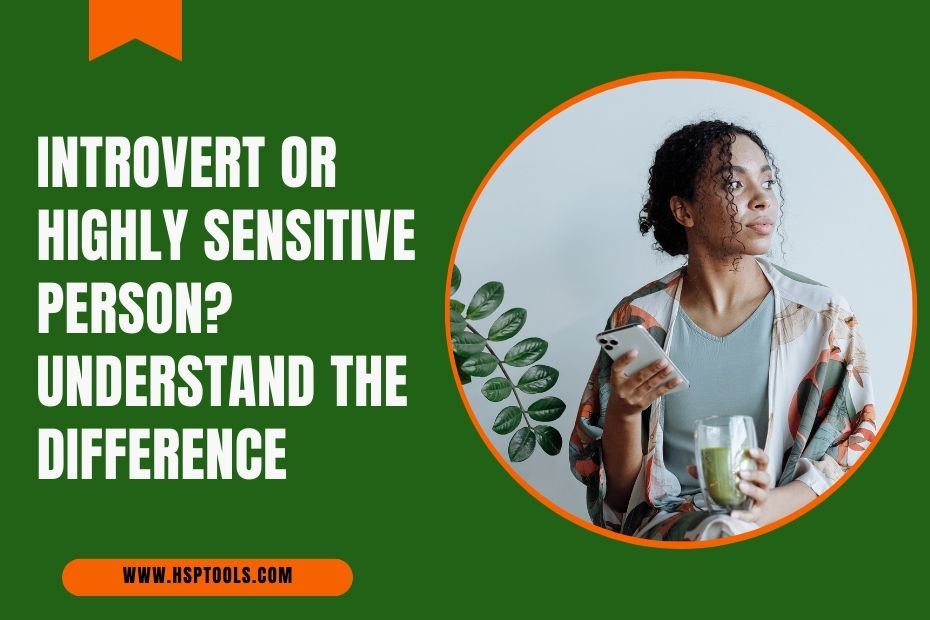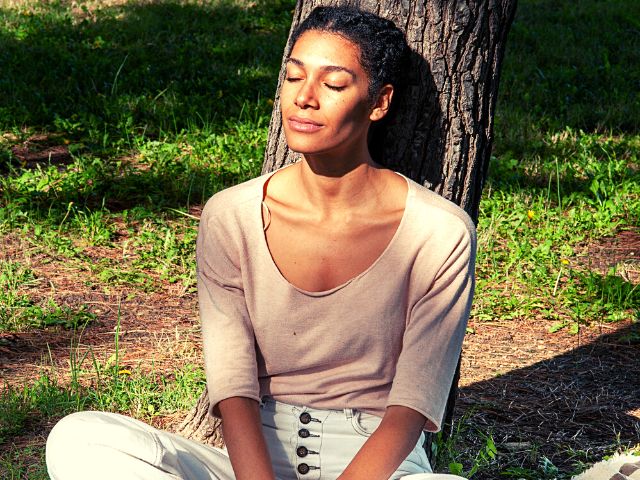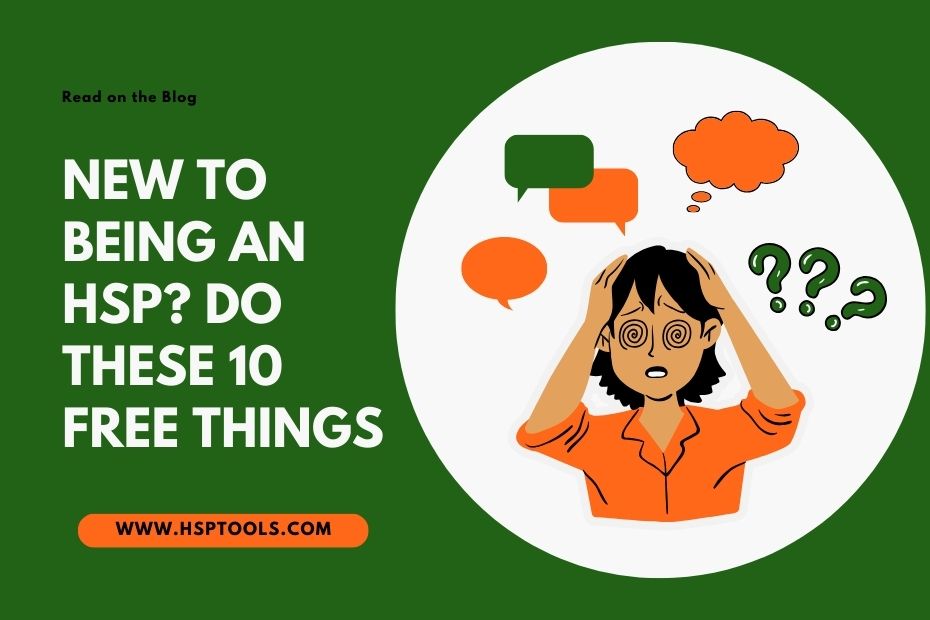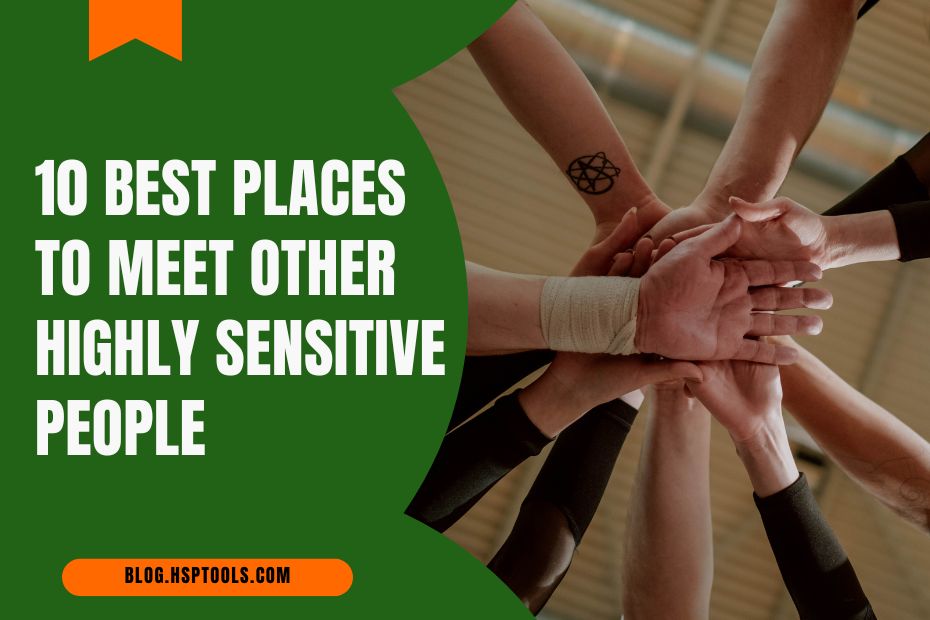What is the difference between a Highly Sensitive Person (HSP) & an Introvert?

As an HSP psychotherapist, a question I am asked constantly is: what is the difference between a Highly Sensitive Person (HSP) and an introvert?
To be perfectly honest, I had been assuming that they were pretty much the same thing until I studied it further.
While there are many similarities, there are also some key differences which I will point out in this article.
Differences Between High Sensitivity and Introversion

One source points out that the differences between high sensitivity and introversion are large enough that the two traits can be considered distinct. This is borne out by the fact that not everyone who is Highly Sensitive is also introverted.
In fact, according to Elaine Aron, PhD, 70% of HSPs are introverts, whereas 30% of HSPs are extroverts.
I like how Karolien Koolhof, an introvert coach, explains the difference on her website:
An introvert is someone who recharges when he or she is alone. An introvert likes to be with other people but prefers smaller groups when doing so. He or she needs more time to recharge, think and analyze things than an extrovert does. High sensitivity is mainly a neurological phenomenon. As an HSP, you process stimuli very deeply, making all kinds of connections.
For introverts, the starting point is inside: that is where you get your energy from and that is also where you return when you run out of energy. You must process stimuli from outside before you will respond to them. As an introvert, you are also more sensitive to it than an extrovert: you are easily over-stimulated, because your brain needs less dopamine (the happiness hormone) than an extrovert. As a result, you have less need to be in constant contact and you prefer to avoid conflicts.
High sensitives are also very sensitive to stimuli and process things deeply. But as an HSP you can also be an extrovert. In that case you have a great need for constant contact with others, but you also want to protect yourself against overstimulation: two opposing forces. It is generally stated that about 70 percent of all highly sensitive people are introverts, but that as much as 30 percent are extroverts. So introversion and high sensitivity are not necessarily always linked.
The sensitivity to stimuli is slightly different for introverts than for HSPs. Introversion is mainly about avoiding stimuli related to contact with others (too large groups of people, conflicts), while for a highly sensitive person the sensory stimuli are the most important ones. Think of loud sounds or bright lights.
Introvert expert Marti Olsen Laney Psy.D. explains the difference between introverts and HSPs as follows:
Highly Sensitive People are born with a certain cluster of traits that is often described as a sixth sense: they are extremely perceptive, intuitive, and observant, with finer discrimination than most of us. They may stay away from social engagements because they dread the agonizing flooding of their senses. Introverts or extraverts can be highly sensitive.
How Do I Know if I am a Highly Sensitive Person (HSP)?
The following comes from an article I wrote on the topic.
I have also included a video at the end, which goes into more detail about the HSP temperament. I urge you to check it out.
Elaine N. Aron, PhD, who has studied the Highly Sensitive personality for over 40 years wrote the book, The Highly Sensitive Person: How to Thrive When the World Overwhelms You. Her research has found that 15-20% of the population is “highly sensitive”. This means that 15-20% of us have highly attuned nervous systems, or what’s been described as having a ‘sixth sense’.
I describe this state as “wearing your skin inside out”– we are like cats with big whiskers that reach far out and our ‘antennae’ are always “on”. Aron calls this a “difference in arousability” in that HSPs notice levels of stimulation that go unobserved by others. This can be a plus as HSPs tend to be visionaries, highly intuitive artists, or inventors, as well as more conscientious, cautious, and wise people.
On the downside, being Highly Sensitive means being stimulated more intensely by everything around one which can often feel overwhelming. Ms. Aron puts it this way: “What is moderately arousing for most people is highly arousing for HSPs. What is highly arousing for most people causes an HSP to become very frazzled indeed…until they reach a shutdown point” (p. 7).
Below is Elaine Aron’s self-test from her book (pp. xxi and xxii).
If you answer true to 12 or more of the questions, you’re probably highly sensitive. If this is the case, I highly recommend you read Ms. Aron’s book(s) to learn how to thrive in the world as an HSP.
True or False?
- I seem to be aware of subtleties in my environment.
- Other people’s moods affect me.
- I tend to be very sensitive to pain.
- I find myself needing to withdraw during busy days, into bed or into a darkened room or any place where I can have some privacy and relief from stimulation.
- I am particularly sensitive to the effects of caffeine.
- I am easily overwhelmed by things like bright lights, strong smells, coarse fabrics, or sirens close by.
- I have rich, complex inner life.
- I am made uncomfortable by loud noises.
- I am deeply moved by the arts or music.
- I am conscientious.
- I startle easily.
- I get rattled when I have a lot to do in a short amount of time.
- When people are uncomfortable in a physical environment I tend to know what needs to be done to make it more comfortable (like changing the lighting or the seating).
- I am annoyed when people try to get me to do too many things at once.
- I try hard to avoid making mistakes or forgetting things.
- I make it a point to avoid violent movies and TV shows.
- I become unpleasantly aroused when a lot is going on around me.
- Being very hungry creates a strong reaction in me, disrupting my concentration or mood.
- Changes in my life shake me up.
- I notice and enjoy delicate or fine scents, tastes, sounds, works of art.
- I make it a high priority to arrange my life to avoid upsetting or overwhelming situations.
- When I must compete or be observed while performing a task, I become so nervous or shaky that I do much worse that I would otherwise.
- When I was a child, my parents or teachers seemed to see me as sensitive or shy.
Watch the video below to learn more about being a Highly Sensitive Person (HSP).
How do I Know if I am an Introvert?
One of the best books I’ve read on introverts is called, The Introvert Advantage: How Quiet People Can Thrive in an Extrovert World by Marti Olsen Laney Psy.D. I love how she calls introverts “innies” and extroverts “outties”.
Here is how she explains introversion:
Introversion is at its root a type of temperament. It is not the same as shyness or having a withdrawn personality, and it is not pathological. It is also not something you can change. But you can learn to work with it, not against it.
The strongest distinguishing characteristic of introverts is their energy source: introverts draw energy from their internal world of ideas, emotions, and impressions. They are energy conservers. They can be easily overstimulated by the external world, experiencing the uncomfortable feeling of “too much”.
This can feel like antsyness or torpor. In either case, they need to limit their social experiences, so they don’t get drained. However, introverts need to balance their alone time with outside time, or they can lose other perspectives and connections.
Introverted people who balance their energy have perseverance and the ability to think independently, focus deeply, and work creatively. p.19
How Introverts Keep Their Batteries Charged
Introverts are like a rechargeable battery. They need to stop expending energy and rest in order to recharge. This is what a less stimulating environment provides for introverts. It restores energy. It is their natural niche.
Introverts are energized by the internal world- by ideas, impressions, and emotions. They need a quiet, perfect place where they can think things through and recharge themselves. (pp. 20-21).
According to Introvertdear.com, about 30-50% of the population are thought to be introverts. That means that up to half of the human population are introverts! Not such a minority after all.
In other words, if you feel “weird” or “different” from others, just look around- you’re in good company!
Jenn Granneman, the founder of Introvertdear.com, wrote a fabulous book I highly recommend: The Secret Lives of Introverts: Inside Our Hidden World.
The Bottom Line: High Sensitivity vs. Introversion
To wrap up, the main difference that I can see between introverts and HSPs is this: Not all introverts are Highly Sensitive.
Some Highly Sensitive People are extroverts; therefore, we cannot lump introversion and the Highly Sensitive personality together in all cases.
***
Disclaimer: This post was first published on EstherKane.Com.






